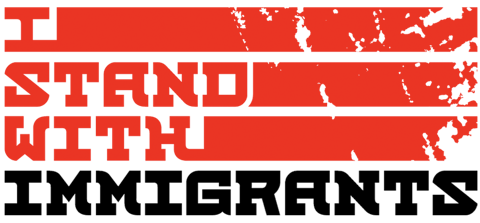Arkan & Muslem
“We want our kids to understand their heritage, and I will teach them Spanish.”
Muslem’s Story
I am originally from Iraq. I came to Lincoln, [Nebraska] in 1998 as a refugee. I was eleven years old. I am 29 now. I kind of grew up in Lincoln. I like it here. The set up is real safe, and it is very diverse. It is a small town with big time infrastructure. When I first came to the U.S., it felt like going to a different planet, because I was in a refugee camp for so long. I was in the refugee camp for six and a half years. Being in that kind of atmosphere for so long, you don’t know that there is something different out there. I didn’t grow up in Iraq where I could see the city infrastructure. We were very limited in what we could see and do. The U.S. helped us come here and get settled. So when I came to the U.S., if felt like a scifi movie. I came here when I was in fifth grade; they just threw me into a class. I didn’t understand anything for the first year. They let me color for the entire fifth grade school year.
I have maintained a strong connection with Middle Eastern culture. Because of our culture and religion we have to have Halal foods, so we built a community. Now, we provide different meats and products to enjoy so that we can still keep our heritage. It also gives Americans and people from other cultures a different view on life when they come into the restaurant where I work. They see weird vegetables or weird drinks and they leave their comfort zone. There are a lot of refugees here in Lincoln; it is a diverse community with people of Vietnamese, Iraqi, and African heritage.
Arkan’s Story
I am from Iraq originally. I came to the U.S. about 16 years ago. I used to live in Phoenix, Arizona. I came here to Lincoln because, I had a sister here and I wanted to be near my family. I became an army contractor here and then started my own business. I started this business last year. The idea about this store is that it is more than a grocery store. I want to bring something from the Middle Eastern culture. About 60 percent of Muslims living in the United States don’t eat meat from American stores because the butchers don’t cut the Halal way. The Halal way is this: when they cut the sheep or the cow, they face it to the east and they pray for the animal before they kill it. This is the same way that Jewish people cut meat: if they don’t cut it a certain way, they do not eat it. Same with Muslims. The main idea of the store is: “You buy, we fry.” If you provide us with the meat, we will cook it however you want us to.
When I first came here I didn’t have a penny in my pocket and I couldn’t speak English. I started working as a housekeeper in some old hotel in Phoenix, Arizona. My second job was as a driver of an ice cream truck. Then I worked for a moving company, and then I applied with an army contractor. I came here alone. Now I have my mom and sister here. I came here because I am a writer—I write poetry. I wrote stuff against the regime there, against Saddam Hussein. My whole family is against that. So I had to run away from Iraq. I first went to Jordan and then applied to the United Nations, and they accepted my file. Out of 50 countries, I chose the United States.
#CELEBRATE IMMIGRANTS
We all know someone with an immigration experience or have an immigrant heritage story of our own. Join us to stay updated as we #CelebrateImmigrants across the country!

